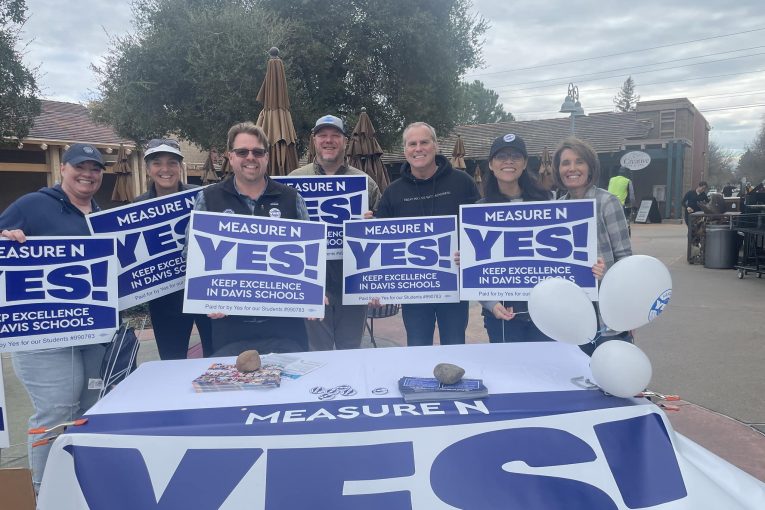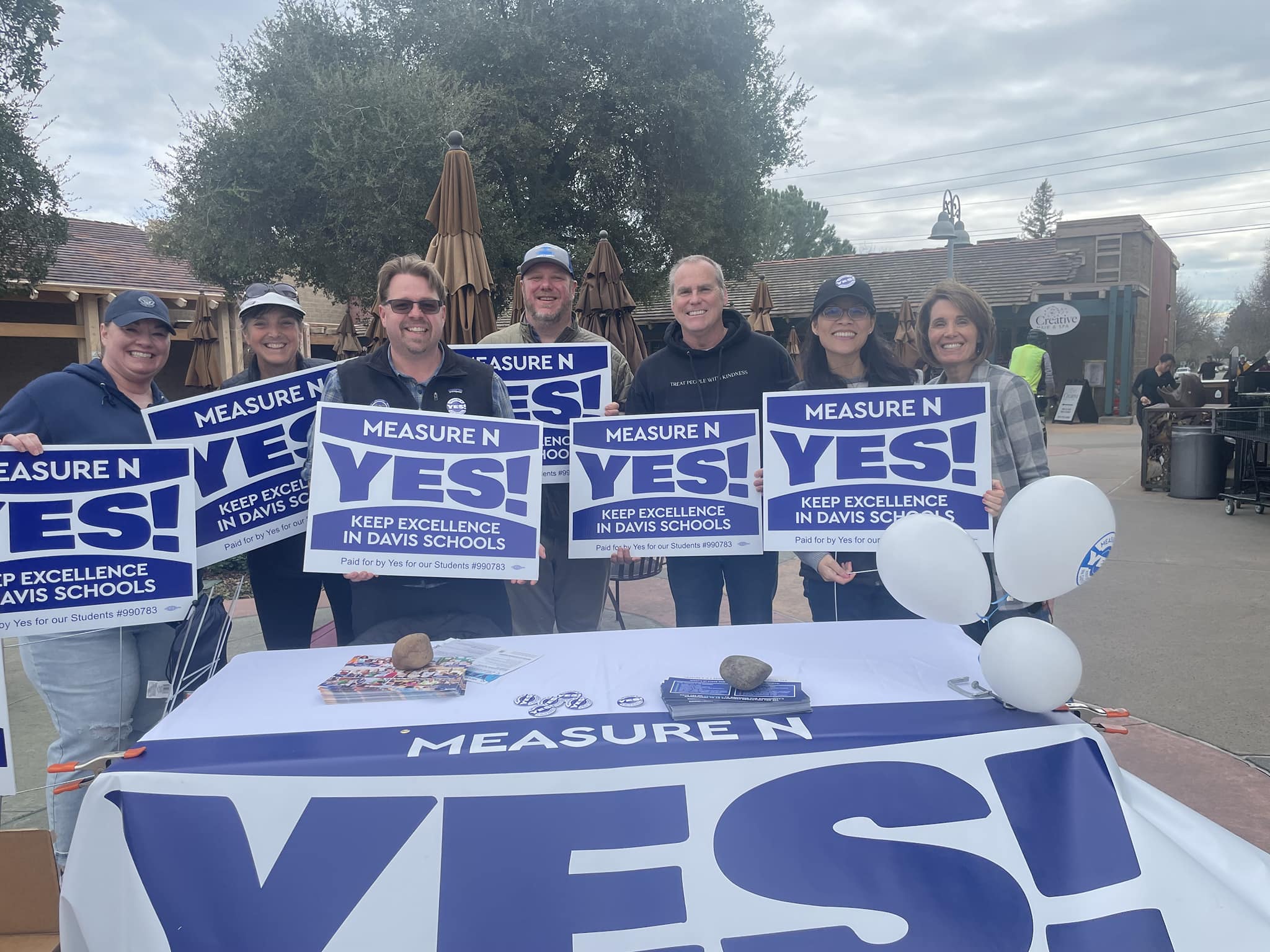

By David M. Greenwald
Executive Editor
Davis, CA – Now all the school district can do is wait. We may not know the results for close to a month. As of right now, it is passing but barely, at 66.91 percent.
Four years ago, the district went through a similar if not worse torment. On election day, it looked like the measure in 2020 was going down. The first returns had it at 63.9 percent of the vote; on election day, it pulled in 66.9 percent of the voting, pushing it to 65.1.
The numbers went from 63.9 percent pre-election day to 66.9 percent on election day, to 69.4 in the first count, to 71.5 percent in the second count, to 74.5 percent in the last two counts.
Obviously anything similar to that trend would be good news for the school district.
However, a lot of factors went into play. There was a huge surge of ballots in 2020 to be counted after election day—over 15,000. Under 11,000 voted this time. There was also a contested Democratic Primary, with Biden not yet having emerged as the clear  favorite. That was not the case this time.
favorite. That was not the case this time.
Other than the Senate primary in California, there was not much to draw the electorate.
Bottom line: too early to make any forecasts here.
However, what I can comment on was the opposition. For the last 15 years or so we have seen opposition from Jose Granda, on taxpayer grounds.
This time, he was joined by Beth Bourne who is angry at the school district for what she sees as pro-transgender policies—ironically almost all of what she is complaining about comes from the state mandates rather than the local district.
In addition, former Councilmember Michael Harrington threw some money in for a mailer and opposed the measure, it would seem arguing that the district should not have an inflator and should not be permanent.
Given the very narrow margins that the district operates, even a tiny impact from these two, really separate, campaigns could have pushed the measure over the 34 percent opposition threshold to failure. And it might still. But until we see the final tally we will not really know if the tactics worked.
I will probably address some of Bourne’s points in a separate column.
Here I will now say that I found Harrington’s arguments problematic at best.
I saw in the newspaper someone suggesting that what the district should have done was make the parcel tax permanent but not have an inflator. The problem with that approach is that you completely defeat the purpose of having a permanent parcel tax if you don’t have an inflator.
Why? Because a constant parcel tax represents declining purchase power over time. So at some point, you will have to pass another parcel tax to adjust for that loss of inflation.
Think of it this way, if I gave you a $20 bill in 1974 and you left it in a drawer and pulled it out this year, would the value of that currency have increased or decreased? The answer is that it would have depreciated in value over those 50 years.
As school Board Member Hiram Jackson put it in a comment on the Vanguard, “One important reason an expiration date was necessary is that the value of the school parcel tax needed to be reset from time to time to account for cost-of-living increases. A four-year school parcel tax value used to be set at a flat rate with an estimate for how much the cost of living would increase in the next four years. “
As I noted the other day, the No campaign has equated an inflator for inflation to be an “increase” when technically baselining a tax to inflation is keeping the tax steady in real dollars.
So why not have the parcel tax continue to have sunsets in four or eight years like before?
I think we have seen a big reason for that, in 2020 and 2024, and it takes a lot of time and energy—and as Hiram Jackson pointed out a few weeks ago, money—to run these elections.
The school district shouldn’t have to just pound and pray every four to eight years for operating money. And that’s where things have been.
Does that mean there is an accountability gap? A little bit. But there are two checks against that. One is that each trustee is up for reelection every four years and the other is that nothing would preclude the community from putting this on the ballot and repealing the tax.
Given that the community has consistently supported these taxes in the 67 to 72 percent range over the last fifteen years, it seems like a permanent tax ask is not unreasonable.
There were other issues brought in that really had little to do with the issues—and I think Harrington did not understand them well.
For instance, declining enrollment and out-of-district transfers.
The parcel tax really isn’t about declining enrollment.
The parcel tax is attempting to bridge the fund gap from the level of state funding granted DJUSD to an average level of support which is significantly lower than the average district due to LCFF.
There was a good discussion of this prior to 2020 with Joe DiNunzio and Alan Fernandes. But, basically, the Local Control Funding Formula disadvantages districts like Davis. And the parcel tax attempts to bring the district up to state average funding levels.
The other problem is declining enrollment. The district has chosen to bridge that gap through out-of-district transfers.
Declining enrollment puts a strain on district dollars separate and distinct from the parcel tax. Declining enrollment threatens to reduce ADA money coming into the school district and while the district can attempt to shed spending, our previous analysis showed that in general the district could only shed 60 cents on the dollar.
In the end, I think, regardless of the result here, the district needs to worry. Passage of this parcel tax will of course lock in that funding level with an inflator into the future, but the need for funding is not going to disappear and the willingness of the voters to support the district while it remains strong is really teetering on the brink. The margins are just that thin.


One of the reasons this is coming down to the wire is because the opponents of Measure N spread a lot of FUD and misinformation. Another possible reason is that some took passage as a forgone conclusion since similar measures have never failed in Davis. I never take such things for granted.
It’s possible. But the other possibility is it’s an artifact of the way votes are tallied.
Don’t bother with that.
There were other issues brought in that really had little to do with the issues—and I think Harrington did not understand them well.
It seems to me that you are unnecessarily charitable when you state Michael Harrington does not understand some of the issues. It appears to me that he and his anti-tax friends understand all they need to know: the parcel tax would be levied against every parcel they own. A parcel tax eats away at the final return on their real estate investments. What more do they need to know? Out of district transfers, parents paying school taxes in their home districts that their children don’t attend, etc., is just a way of throwing it all against the wall and hoping as much of it will stick as possible for the disaffected. The Chaos Crew relies on the absence of a facts-in-context picture that the public can readily understand.